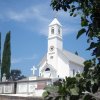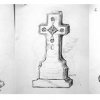У једном одговору у Американском Србобрану ожалошћеној мајци која се сахранила мужа и децу и не зна где су им гробови, владика Николај је написао следеће:
...Саветујем ти, дакле, иди на гробље кад и други иду. Има дивно уређених српских гробља у Америци. Уредили су их Срби староседиоци који су гробље сматрали – како и треба сматрати – најсветијим местом после храма Божјег. Да знаш како су красна српска гробља у манастиру Св. Саве, па у Питсбургу два, Св. Саве и Св. Ђорђа, па оно чувено међу свим православним народима у Сан Франциску (српског добротворног друштва) па оно прастаро у Џексону, у Лос Анђелесу, и на другим местима.
Но чуј да ти нешто испричам, што ти може послужити примером. Једних задушница ја сам ходио по огромном и величанственом гробљу београдском. Свуда око мене докле очима видиш блистале су хиљаде и хиљаде свећа као најлепше цвеће које људи могу посадити у земљу. У тим пламеновима ја сам читао радост умрлих који као тихо певаху: живи смо, живи смо! На крају гробља видех једну познату ми госпођу. Стајала је над неким занемареним гробовима са нечитким споменицима и хумкама без икаквих споменика. Над тим гробовима она беше запалила читаву руковет свећа. Она је скрушено гледала у те свеће и у њиховом треперењу читала радост оних под земљом. И плакала је. Упитах је, ко је од њених ту сахрањен? Нико, одговори она. Муж ми је, вели, скоро премештен у Београд, а сви наши покојници погребени су у месту његовог ранијег службовања. Ја, вели, не могу да одем тамо, далеко је, па сам ето дошла овде на ове непознате гробове и запуштене, да учиним другима што не могу својима. Ваљда ће Благи Бог примити ово и за моје. – Хоће, госпођо, хоће посигурно, рекох и удаљих се размишљајући: Боже, паметна народа! Шта све може човек научити од народа, наученог од Бога!...






